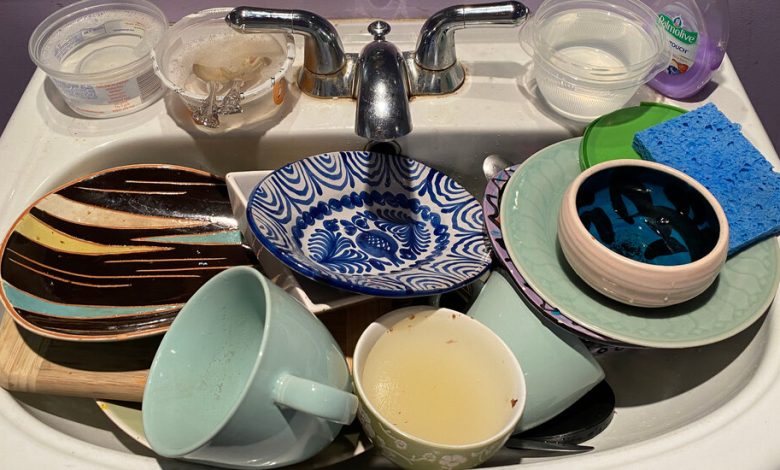Why Unpaid Labor Is More Likely to Hurt Women’s Mental Health Than Men’s

In countries around the world, women do more unpaid labor — housework, child and elder care, and the mental load of managing a family — than men. New research suggests it takes a health toll on many of them.
The more of this labor women do, the worse their mental health, found a meta-analysis of 19 studies covering 70,310 people globally, published this month in The Lancet Public Health. It analyzed the unpaid labor of people who also worked for pay. Other recent studies have similarly found that women’s household labor is associated with poor health, both physical and mental.
The findings point to a reason women are more often diagnosed with anxiety and depression than men, and help explain why, now that schools are open and mothers are back at their jobs, they still feel more stress than they did before the pandemic. The mental health effects of such additional work that mothers did in the depths of the pandemic, and still do, hang on.
“In many ways, Covid has stalled or in some instances reversed some of the hard-won gains in gender equality,” said Jennifer Ervin, an author of the study and a Ph.D. candidate at the Center for Health Equity at the University of Melbourne in Australia. But, she added, the results show that “reducing the disproportionate unpaid labor burden on women, by enabling men to take on their equal share, has the potential to improve women’s mental health.”
Housework and child care, the research found, have much less of an impact on men’s mental health. That’s probably because they do so much less of it. In the United States, women do an average 4.5 hours of such work a day, compared with 2.8 hours for men, according to data from the Organization for Economic Cooperation and Development (it calculates overall averages, regardless of whether people are employed). In Greece, women do 4.3 hours while men do an hour and a half. Even in the most gender-equal countries, like Sweden, women do 50 minutes more a day than men.
During lockdowns, men did more unpaid labor than they had before, but so did women, so their total shares remained about the same. This was true in a variety of countries.
But it’s also because the type of such work men do is generally less time-sensitive and more enjoyable, or at least more tolerable. For example, men are more often responsible for outdoor tasks, like mowing the lawn, that are done less often and on their own schedule. Women are more likely to take on daily tasks that need to be done at certain times, like preparing meals or cleaning up.
Societal expectations probably also play a role. Studies have shown that women feel pressure to keep their homes clean, for instance, and feel judged if they don’t. Men, on the other hand, are often praised for doing mundane tasks like cleaning a house or taking a child to an appointment.
It’s not unpaid labor itself that is problematic, research has found. Rather, it’s all the baggage around it — whether it conflicts with someone’s other responsibilities, like paid work, and whether it’s what someone wants to be doing.
Social scientists first named these issues more than half a century ago, and they’ve only become more acute since then, as more women have taken on paid work. “Role strain,” a term coined in 1960 by the sociologist William J. Goode, describes what happens when someone’s multiple roles interfere with their performance in others — when long hours of unpaid domestic work make people feel less able to do their paid work, or vice versa.
“Time poverty” — a term social scientists use to describe not having enough time to do work or leisure activities — particularly affects women with caregiving demands and people with inflexible, low-paid jobs. Time poverty contributes to declines in mental health, research shows, and also makes it harder to do things that improve health, like exercising, sleeping or nurturing friendships. One study found that while opposite-sex couples are increasingly likely to share responsibility for paid and unpaid work, men spend significantly more leisure time on weekends while women do more housework.
In some cases, parents who forgo paid work to care for children have been found to be happier about their unpaid labor — but not always. It depends if that aligned with what they wanted to do, or if they felt they had little choice about it.
“It’s not clear-cut that doing a larger amount or greater share of unpaid domestic work is negatively associated with physical or mental health per se,” said Daniel L. Carlson, a sociologist at the University of Utah, who studies the topic. “Mothers who have majority responsibility for those tasks but are also very conventional in their gender roles are OK with that responsibility. But women who believe more in egalitarianism having those responsibilities leads to poorer mental health.”
Part of that is discordant identities, he said: “I want to be this person, but I’m not.”
Tellingly, while same-sex couples tend to split primary responsibility for work and family once they have children, they tend to be happier with the division. Research has found that it’s because there is more often a conversation about who will do what, rather than an assumption based on gender.
The Lancet researchers said that drawing definitive conclusions from the 19 studies was difficult and that more research would be welcome. One hole in the academic research, which some newer studies are beginning to address, is a more detailed look at how different types of chores and responsibilities affect people.
People tend to like shopping more than laundry, for instance, and cooking more than dishwashing. Child care may feel more rewarding than housework — and reading or going on a walk with a child more enjoyable than calming a tantrum or handling a 3 a.m. wake-up.
But what seems clear, the researchers said, is that when men do more unpaid labor, it eases the impacts on women.





